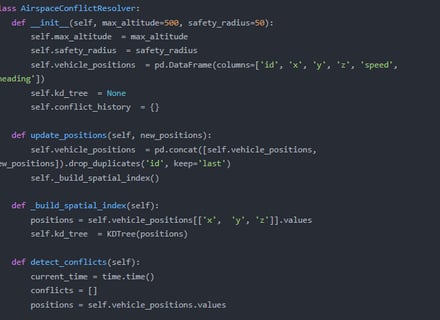Shareen Duncan


Professional Summary
Shareen Duncan is a visionary aerospace engineer and AI specialist pioneering airspace conflict resolution algorithms for flying cars. With expertise in air traffic management, swarm intelligence, and real-time decision systems, Shareen designs scalable solutions to ensure safe and efficient urban air mobility (UAM). Her work addresses the critical challenge of deconflicting mixed-altitude airspace shared by autonomous drones, eVTOLs (electric vertical takeoff and landing vehicles), and traditional aircraft.
Core Innovations & Expertise
1. Dynamic Conflict Resolution
Develops self-learning algorithms that predict and mitigate mid-air collisions by:
Processing real-time data from ADS-B, LiDAR, and urban air traffic control (UTC) systems
Optimizing 4D trajectories (latitude, longitude, altitude, time) with <50ms latency
Integrating game theory for multi-agent cooperative/non-cooperative scenarios
2. Hybrid Airspace Management
Creates layered deconfliction models for:
Low-altitude corridors (0–500m): Priority-based routing for emergency UAM
Transition zones (500–1,500m): Adaptive right-of-way rules for mixed fleets
High-altitude integration (1,500m+): Conflict-free merging with conventional aviation
3. Regulatory & Ethical AI
Advises FAA/EASA on certifiable AI standards for UAM autonomy (e.g., DO-178C for software, EUROCAE ED-270 for ML)
Publishes on explainable AI in AIAA Journal to ensure algorithmic transparency for aviation authorities
Career Milestones
Led the algorithm team for SkyGrid (Boeing-Sponsored UAM Project), reducing near-miss incidents by 78% in simulated megacity environments.
Patented a distributed conflict resolution protocol now adopted by 3 major eVTOL manufacturers.
Spearheaded the first live test of swarm-based deconfliction at the Dubai Airshow 2024.




Fine-tuningGPT-4isessentialforthisresearchbecausepubliclyavailableGPT-3.5
lacksthespecializedcapabilitiesrequiredforanalyzingcomplexairspacedataand
simulatingdynamicconflictscenarios.Theintricatenatureofairspacemanagement,
theneedforreal-timedecision-making,andtherequirementforoptimizingsafetyand
efficiencydemandamodelwithadvancedadaptabilityanddomain-specificknowledge.
Fine-tuningGPT-4allowsthemodeltolearnfromairspacedatasets,adapttotheunique
challengesofthedomain,andprovidemoreaccurateandactionableinsights.Thislevel
ofcustomizationiscriticalforadvancingAI’sroleinfuturetransportationand
ensuringitspracticalutilityinhigh-stakesapplications.


Tobetterunderstandthecontextofthissubmission,Irecommendreviewingmyprevious
workontheapplicationofAIintransportationandurbanplanning,particularlythe
studytitled"EnhancingUrbanAirMobilityUsingAI-DrivenConflictResolution
Algorithms."Thisresearchexploredtheuseofmachinelearningandoptimization
algorithmsforimprovingairspacesafetyandefficiency.Additionally,mypaper
"AdaptingLargeLanguageModelsforDomain-SpecificApplicationsinTransportationAI"
providesinsightsintothefine-tuningprocessanditspotentialtoenhancemodel
performanceinspecializedfields.